Key takeaways
- The Portland writers community fosters a supportive environment where diverse voices inspire growth and connection through storytelling.
- Themes in writing serve as crucial anchors that guide both writers and readers, fostering empathy and revealing common human experiences.
- The Literary Arts Center offers practical support and emotional encouragement, creating spaces for writers to share vulnerabilities and celebrate progress.
- Engaging in theme discussions enhances personal growth by encouraging openness, fresh perspectives, and a deeper understanding of one’s own writing journey.
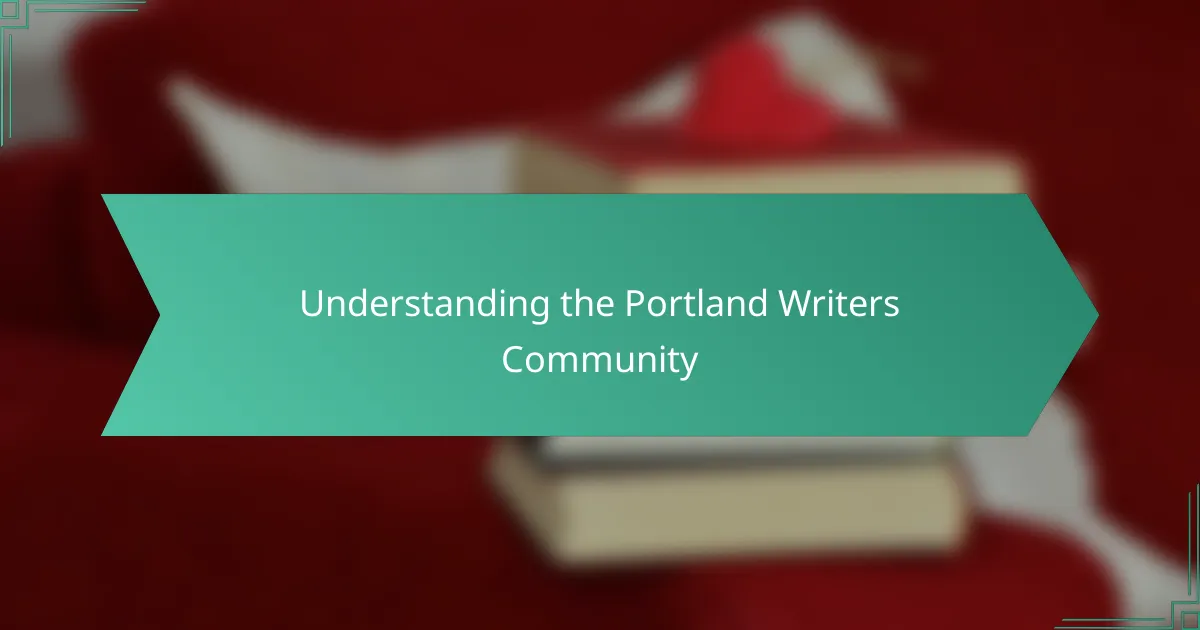
Understanding the Portland Writers Community
When I first stepped into the Portland writers community, I was struck by its openness and warmth. It’s not just a group of people who write; it feels like a supportive family where everyone genuinely wants to help each other grow. Have you ever felt that rare kind of encouragement that pushes you to take your writing to the next level?
One thing I’ve noticed is how diverse the voices are here. From poets to novelists, memoirists to essayists, the variety brings a richness that constantly inspires me. It makes me wonder how different perspectives shape the narrative of our city’s literary scene.
What truly defines this community, in my opinion, is the shared passion for storytelling combined with a willingness to listen. That openness invites vulnerability, which I think is essential for authentic art. It’s a reminder that writing isn’t just about words on a page; it’s about connecting with others on a deeper level.
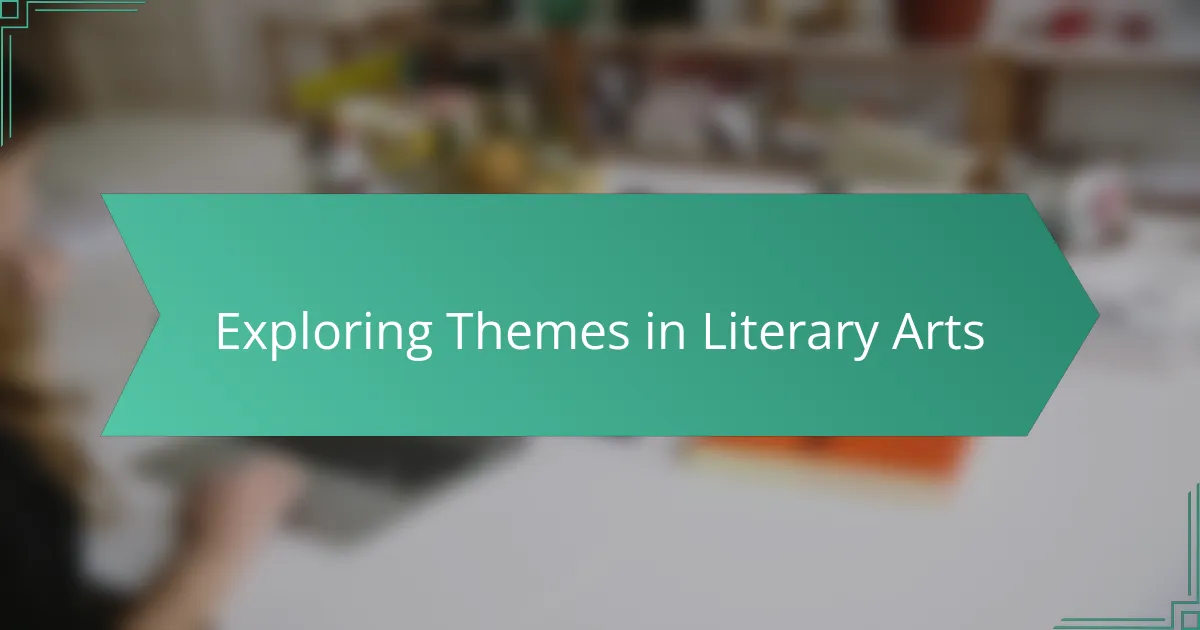
Exploring Themes in Literary Arts
Exploring themes in literary arts feels like uncovering the hidden threads that connect stories across time and place. When I join discussions at the Literary Arts Center, I often find myself fascinated by how a single theme can manifest so differently depending on the writer’s background and experiences. Have you ever noticed how themes like identity or resilience can resonate uniquely with each person in the room?
I remember once participating in a workshop where the theme was ‘belonging.’ Hearing everyone’s take—from poems about cultural roots to essays on personal acceptance—made me realize how powerful and multifaceted a theme can be. It’s in those moments that I see the magic of thematic exploration: it’s not just about analysis, but about empathy and connection.
Themes also challenge me to dig deeper into my own writing. Discussing them openly pushes me beyond surface-level storytelling and encourages me to engage with bigger questions about life and humanity. That challenge, although sometimes daunting, is what keeps my creative spark alive.
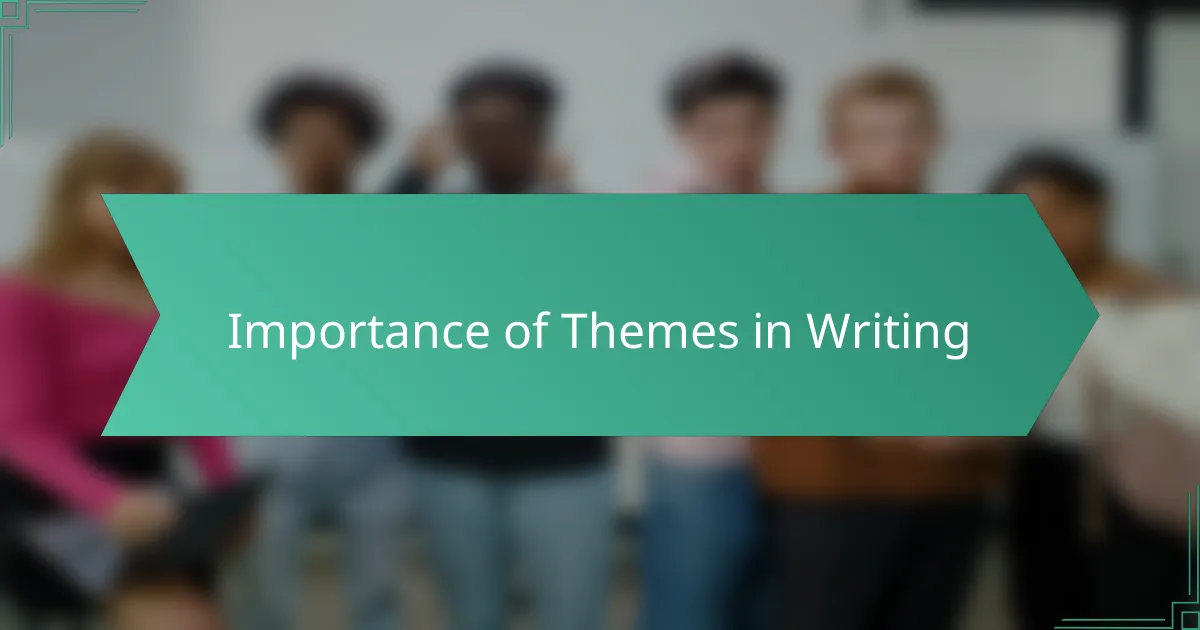
Importance of Themes in Writing
Themes are the heartbeat of any story, providing the deeper meaning that anchors a writer’s words. I’ve noticed that without a clear theme, writing risks feeling aimless—as if the message is lost amid the details. Have you ever come across a story that lingered in your mind long after you finished reading? More often than not, it’s because the theme struck a chord within you.
In my experience, themes act like a compass, guiding both the writer and the reader through the narrative journey. When I focus on a theme, it shapes every choice I make, from character development to plot twists, creating a more cohesive and impactful story. It’s incredible how a single theme can spark new insights and deepen emotional connection.
But themes aren’t just about structure—they’re also about empathy. Discussing themes with others in the Literary Arts Center has taught me that shared themes reveal our common humanity, even when our stories are vastly different. Isn’t it fascinating how exploring a theme like loss or hope can open doors to understanding perspectives we might otherwise overlook?

How the Literary Arts Center Supports Writers
The Literary Arts Center feels like a lifeline for writers, offering spaces where creativity isn’t just welcomed—it’s nurtured. I remember attending one of their workshops when I was struggling to find my voice, and the guidance I received helped me see my writing in a new light. Have you ever experienced a moment where someone’s encouragement made you believe in your work more deeply?
Beyond workshops, the Center creates community through readings and open mics, which, to me, are more than just events—they’re opportunities to share vulnerabilities and celebrate growth. Listening to other writers bravely put their work out there reminded me that writing is both a personal and collective journey. How often do you get to connect with a room full of people who genuinely want to uplift your creative spirit?
What stands out most is how the Center balances practical support with emotional encouragement. They provide resources like mentorships and grants, yes, but also foster an environment where doubts and fears about writing can be voiced without judgment. That kind of support has a way of transforming hesitation into confidence, and that transformation is truly powerful to witness firsthand.
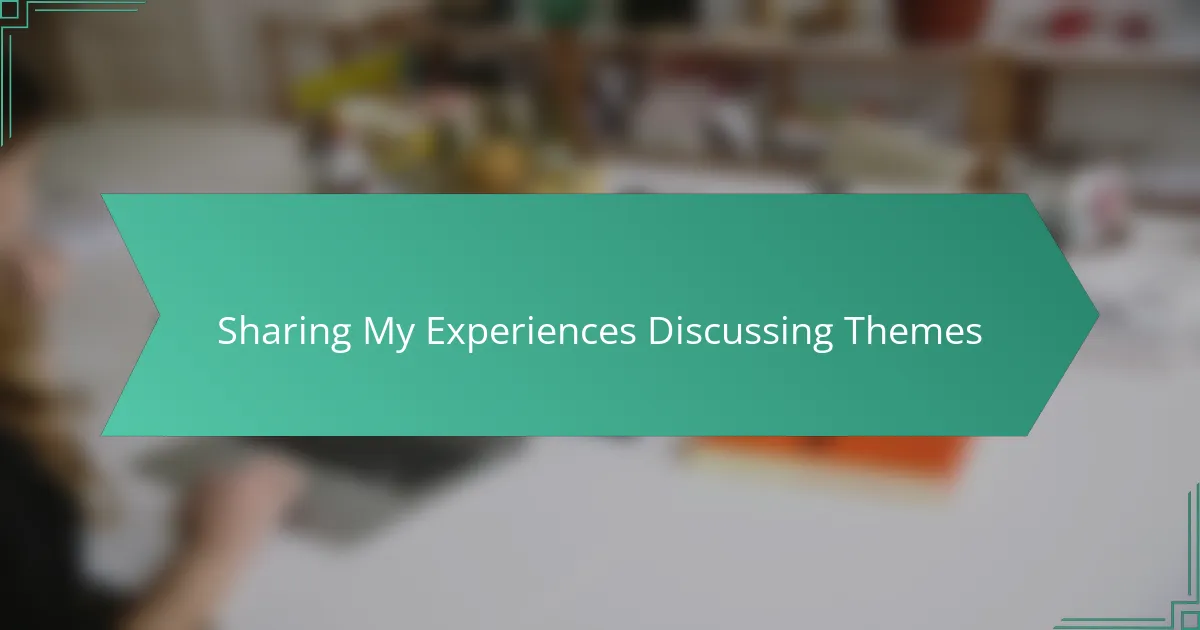
Sharing My Experiences Discussing Themes
Discussing themes at the Literary Arts Center often feels like stepping into a collective brainstorm where every voice adds color to the conversation. I recall one session where the theme of transformation sparked such diverse interpretations that it left me reflecting on my own growth in ways I hadn’t considered before. Have you ever had a simple discussion turn into an unexpected journey of self-discovery?
What strikes me most is how openly people share their personal connections to themes, creating an atmosphere that feels safe yet charged with creative energy. It’s not just about dissecting ideas; it’s about listening to others’ stories and realizing how those shared threads weave us together. Those moments remind me why I keep coming back—the insights and empathy I gain are invaluable.
Sometimes, these theme discussions challenge me to rethink my own approach to writing. When others offer fresh perspectives, I’m pushed to explore nuances I might have missed on my own. That kind of feedback is a gift, and it’s one reason why engaging in these conversations has become an essential part of my creative process. Don’t you find that a good dialogue can open doors you didn’t know were there?
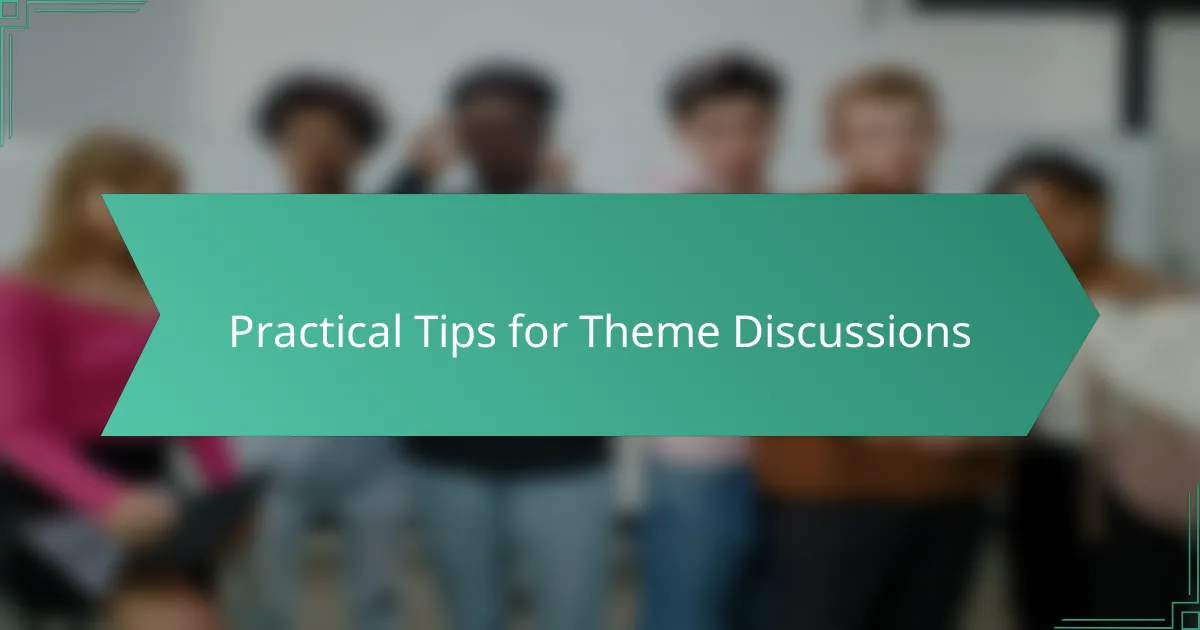
Practical Tips for Theme Discussions
One practical tip I’ve found invaluable is coming to theme discussions with an open mind. It’s tempting to cling to your own interpretation, but I’ve learned that listening attentively to others can uncover layers you never considered. Have you noticed how a simple shift in perspective can suddenly make a theme feel more vibrant and real?
Another helpful approach is to bring specific examples from your writing or reading to the conversation. When I share a particular scene or line that relates to the theme, it sparks more focused and meaningful dialogue. This practice grounds abstract ideas in concrete experiences, making the discussion richer and more engaging.
Lastly, I recommend setting aside any pressure to “solve” the theme or pin down one meaning. Sometimes, the most rewarding part of these discussions is embracing the messy, evolving nature of themes. When I stop trying to find the perfect answer, I feel freer to explore and connect with others’ stories on a deeper level. Isn’t it refreshing to see themes as invitations rather than puzzles?